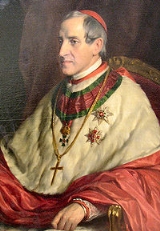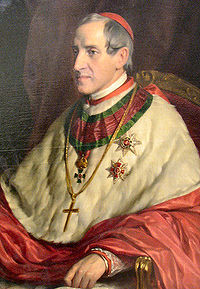
Joseph Othmar Rauscher
Encyclopedia

Austrians
Austrians are a nation and ethnic group, consisting of the population of the Republic of Austria and its historical predecessor states who share a common Austrian culture and Austrian descent....
Prince-Archbishop of Vienna and Cardinal
Cardinal (Catholicism)
A cardinal is a senior ecclesiastical official, usually an ordained bishop, and ecclesiastical prince of the Catholic Church. They are collectively known as the College of Cardinals, which as a body elects a new pope. The duties of the cardinals include attending the meetings of the College and...
.
Life
He received his earlier education at the gymnasium in Vienna, devoting himself chiefly to the study of jurisprudence; he also gave much time to the study of poetry, and many examples of his verses have survived. Later his desire to enter Holy Orders was opposed by his parents, but he finally overcame their objections.After his ordination he was appointed curate
Curate
A curate is a person who is invested with the care or cure of souls of a parish. In this sense "curate" correctly means a parish priest but in English-speaking countries a curate is an assistant to the parish priest...
in Hütteldorf
Hütteldorf
Hütteldorf is a part of Vienna's 14th district, Penzing. It is located in the west of Vienna, but roughly in the geographical center of the district, stretching roughly from Deutschordenstraße in the east to Wolf in der Au in the west, where Hütteldorf borders Hadersdorf-Weidlingau.Hütteldorf is...
, and later professor of church history and canon law at Salzburg
Salzburg
-Population development:In 1935, the population significantly increased when Salzburg absorbed adjacent municipalities. After World War II, numerous refugees found a new home in the city. New residential space was created for American soldiers of the postwar Occupation, and could be used for...
, where Friedrich Prince Schwarzenberg, director of the Oriental Academy at Vienna, was among his pupils. In January, 1849, Cardinal Schwarzenberg named his former teacher Prince-Bishop of Sekkau, "in recognition of his distinguished qualities, knowledge, and services".
In this capacity Rauscher introduced pastoral conferences, and restored to the Redemptorists their mission houses. He also fostered religious associations, and put an end to the intrigues of the Rongeaner, although important business detained him for the most part in Vienna. He attended the episcopal assembly which inaugurated the ecclesiastical revival in Austria; between 29 April and 20 June 1849, twenty-five bishops and four episcopal proxies held sixty sessions. The last in order of consecration, Rauscher took the most prominent part in the transactions. He laid before the assembly a promemoria, which served as the programme of the business, and drafted five of the seven memorials addressed to the Ministry of the Interior. He also drew up the decrees to serve for the bishops "as the common rule of their aim and activity". The pastoral of the bishops to the clergy was also composed by him. Before the bishops separated, they chose a committee of five members for the settlement of the memorials and the arrangement of all current affairs. As the reporter of this committee, he acted at times as its sole agent.
Prince-Archbishop of Vienna
Rauscher was the father of the Austrian Concordat. On 14 September 1852, a cabinet order appeared, naming him imperial plenipotentiary for the conclusion of a concordat. The negotiations were long and troublesome; during them Rauscher was named Prince-Archbishop of Vienna, and made his solemn entry into the Cathedral of St. Stephen on 15 August 1853. To promote the Concordat he found it necessary to visit Rome, where he was engaged in the most difficult negotiations for seven months. He was thus able to take part in the solemnities in connexion with the definition of the Immaculate ConceptionImmaculate Conception
The Immaculate Conception of Mary is a dogma of the Roman Catholic Church, according to which the Virgin Mary was conceived without any stain of original sin. It is one of the four dogmata in Roman Catholic Mariology...
. Finally, on 18 August 1855, the Concordat was signed and on 5 November it was published as a law "applicable throughout the empire". For the homogeneous introduction of the concordat sixty-six bishops assembled in Vienna in 1856. Rauscher was raised to the cardinalate in 1855. By 1 January 1857, ecclesiastical court
Ecclesiastical court
An ecclesiastical court is any of certain courts having jurisdiction mainly in spiritual or religious matters. In the Middle Ages in many areas of Europe these courts had much wider powers than before the development of nation states...
s, for which Rauscher composed the instructions (Instructio pro indiciis ecclesiasticis), were established in all the episcopal sees. Provincial synods prescribed the special application of the Concordat to the individual dioceses. The decrees of the Viennese Council of 1858, directed by Rauscher and ratified by Rome, served as an important form of clerical life and ecclesiastical activity.
After Austria's wars of 1859-66, he found himself on the defensive, since blame for the defeats was referred to the Concordat. The archbishops and prince-bishops were members of the House of Peers
House of Peers
The House of Peers can refer to:*The British House of Lords, which is known as the "House of Peers" for ceremonial purposes*The House of Peers, the upper House of the portuguese Parliament until 1910.*The Chambre des pairs of the Bourbon Restoration...
; thus, when the war on the Concordat opened in the Reichstag in 1861 and its revision was demanded, Rauscher with the other episcopal members of the Upper House deliberated concerning an address to the emperor. When the House of Delegates
House of Delegates
The House of Delegates is the name given to the lower house of the legislature in three U.S. states – Maryland, Virginia, and West Virginia.House of Delegates may also refer to:...
demanded the removal of the religious orders from the penitentiaries, hospitals, and other state institutions, he declared in the House of Peers:
In consequence of the events of 1866, a storm against the Concordat and the Church broke out violently, and the Press added to it. When the drafts of the new laws concerning marriage, the schools, and the interconfessional relations, in respect to which points there were many gaps in the Concordat, came up for discussion in the House of Peers, Rauscher delivered a speech on the Concordat, urging harmony between the spiritual and secular powers. When the decrees had been sanctioned, and the new laws had been condemned by the pope, there arose great dissatisfaction and turmoil. Rauscher demanded: "Is it not permissible for a pope to pronounce a law unjust? Every newspaper arrogates to itself the right of stigmatizing the injustice of all laws which do not agree with its partisan views". A little later the pastoral of Bishop Rudigier of Linz was seized, and the bishop himself subsequently condemned to fourteen days' imprisonment with costs; the pastoral was to be suppressed. However, Rauscher immediately obtained from the emperor the annulment of the sentence and of the consequences which it entailed with respect to civil rights and relations.
The Austrian bishops proceeded to the First Vatican Council
First Vatican Council
The First Vatican Council was convoked by Pope Pius IX on 29 June 1868, after a period of planning and preparation that began on 6 December 1864. This twentieth ecumenical council of the Roman Catholic Church, held three centuries after the Council of Trent, opened on 8 December 1869 and adjourned...
immediately after the conflict over the Concordat. Rauscher regarded the assembly with the greatest hopes and issued two pastorals dealing with the council on 15 November 1869. Pope Pius IX
Pope Pius IX
Blessed Pope Pius IX , born Giovanni Maria Mastai-Ferretti, was the longest-reigning elected Pope in the history of the Catholic Church, serving from 16 June 1846 until his death, a period of nearly 32 years. During his pontificate, he convened the First Vatican Council in 1869, which decreed papal...
appointed him to the commission pro recipiendis, which had to investigate all motions submitted. At the first real session of the council (the General Congregation of 28 December) he delivered the first address, and twice spoke against the opportuneness of a universal catechism; the needs and the degrees of culture of the individual peoples were too different. As to the question which finally most strongly stirred the minds of those in and outside the council, that of the infallibility of the pope teaching ex cathedra, Rauscher was the leader of the bishops who combatted the expediency of the definition. His work, "Observationes quædam de infallibilitatis ecclesiæ subjecto", appeared at Naples, and was reprinted at Vienna; the author later explained that it "was especially intended to emphasize the fact that the proposed decision would afford parties hostile to the Church those subterfuges of which they were in need". In the general debate Rauscher, who was ill, had his speech read by Bishop Hefele; it lasted over an hour, and ends characteristically: "But always shall I adore the ways of the Lord", He repeatedly took part in the special debates (8, 9, and 15 June), and at the ballot in the General Congregation of 13 July he voted non placet. However, he did not sign the memorial of the fifty-five bishops of the minority to Pius IX on 17 July, believing he had done all that he should. On 17 July he took leave of the pope, and later, as Archbishop of Vienna, promulgated the doctrinal decrees of the Vatican Council. He protested the suppression of the Papal States
Papal States
The Papal State, State of the Church, or Pontifical States were among the major historical states of Italy from roughly the 6th century until the Italian peninsula was unified in 1861 by the Kingdom of Piedmont-Sardinia .The Papal States comprised territories under...
, on 20 September 1870. In May 1874 Austrian laws concerning the external legal position of the Catholic Church, the contributions to the religious funds, and the legal recognition of religious societies were issued.
His body rests in Our Lady's Choir of the Stephanskirche before the steps of the altar. At the wall beneath the Rauscher window is his monument.

